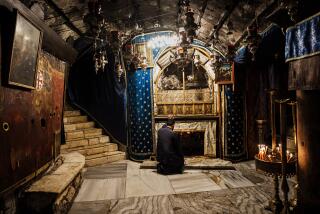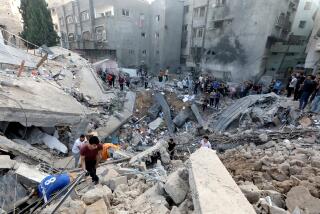Mob targeted Pakistani Christians
- Share via
GOJRA, PAKISTAN — Ethel Khurshid Gil gingerly held out the charred Bible she pulled from the rubble of her home, using a swatch of cellophane to keep the scorched pages from scattering in the hot wind. “Look how they’ve destroyed our Bibles!” the 47-year-old Christian Pakistani cried out.
Not far away, charred wood and broken dishes crunched underfoot as Umair Akhlas stepped through his house to point out the blackened bedroom where he and his relatives hid from the mob that firebombed the building, shouting “Burn them alive!”
Akhlas and several relatives escaped. But six, including two children, couldn’t breach the flames and died in that room.
“They were screaming Christians are dogs, that we’re American agents,” Akhlas said. “They look for any reason to do something against Christians.”
Pakistan has had its hands full waging war against a Taliban insurgency. Now another troubling crisis simmers. Last week, riots broke out in Gojra, a city of 150,000 in the eastern province of Punjab, after accusations surfaced that Christians at a wedding ceremony had desecrated a copy of the holy Koran.
Police say the accusations were unfounded. Nevertheless, Muslims attacked Christian enclaves in Gojra on July 30 and again Saturday. The second outbreak turned out to be far worse: A mob of more than 1,000 people set fire to more than 40 Christian homes in a warren called Christian Town. All six who died in the flames belonged to Akhlas’ family. A seventh family member, Akhlas’ grandfather, was killed by gunmen in the mob.
Investigators say several factors stoked the violence. Members of a militant group seized on the accusations to incite Muslims to attack Christian neighborhoods, government officials say. After attackers set fire to Christian homes in the initial violence last week, police had ample time to assert control, but instead allowed street rallies to mushroom into riots.
And there are differing accounts of who initiated gunfire that fueled the violence Saturday. Christians say Muslims fired first; Muslims blame the Christians.
Perhaps the bigger problem for Pakistan is the harsh light the riots have shone on the country’s dismal record for protecting the rights of ethnic and religious minorities.
Minority Rights Group International, a London-based watchdog organization, ranks Pakistan as the world’s sixth- most dangerous country for minorities. Along with Christians, groups under threat include a variety of ethnicities, such as Pashtun in the northwest and Balochis and Sindhis in the south, the group says. Minority Shiite Muslims have also been victimized by Sunni Muslim radical groups.
Recognizing that violence could escalate, government officials denounced the attacks. Punjab province’s chief minister, Shahbaz Sharif, told a gathering of Christians in Gojra on Tuesday that Pakistani leaders “do not have the right to rule if we cannot protect and provide justice to minorities.”
On the same day, Punjab Gov. Salman Taseer met with victimized families and said later of them and the violence that “this will not happen again. These people are as much Pakistanis as we are.”
The Human Rights Commission of Pakistan called the riots “a comprehensive failure by the government to protect minorities.” Pope Benedict XVI said he was “deeply grieved” by the “senseless attack.”
However, Christians do not hold out much hope that attitudes will change any time soon. Representing less than 2% of the nation’s 175 million people, Christians historically have occupied the lower rungs of society, largely relegated to menial jobs. A law against making derogatory remarks about Islam or desecrating the Koran is often used to settle scores against Christians.
“We are marginalized, that’s a fact,” said Cecil Chaudhry, a Christian human rights activist. “And a big cause for this marginalization is the use of discriminatory laws like the blasphemy law.”
In Gojra, the atmosphere between Muslims and Christians remains tense. Additional police have been posted throughout the city. Many Christians say they would leave, if they could.
“We have to live here,” said a pastor of a small church in Christian Town who identified himself only as Sarfraz. “We have no money to go anywhere else.”
Shahbaz Bhatti, Pakistan’s minister for minority affairs, said trouble in Gojra began July 26, when allegations surfaced that Christians at a marriage ceremony had put henna on pages of the Koran. Henna dye is often used to decorate a woman’s palms for weddings. In reality, the henna was put on newspaper pages, not on the Koran, Bhatti said.
Four days later, announcements rang out on mosque loudspeakers that Christians had desecrated the Koran. A throng marched to a Christian enclave in Gojra and burned several houses there. More calls to attack Christians came from mosques Friday.
On Saturday, more than a thousand Muslims, some masking their faces and wielding Kalashnikov assault rifles, converged on Christian Town. Young Christian men armed themselves, took to rooftops and fended off the rioters for several hours. But by midafternoon, Christians had run out of ammunition. Outnumbered police also ran out of ammunition and tear gas canisters.
At Akhlas’ home, the family locked themselves in a bedroom. When assailants failed to break down the bedroom door, one of them shouted to the family, “If you stay, you’ll burn alive. If you leave, we’ll shoot you.”
Akhlas, 18, and several relatives escaped up to the rooftop. The men put cooking pots on the heads of two children to shield them from stones thrown by the mob below. Akhlas and the others got away, but three women, one of Akhlas’ brothers and two girls, ages 2 and 9, died in the burning bedroom.
“I’m not sure why we continue living in this country,” Akhlas said. “We don’t get a proper education, we don’t get any opportunities, we only get jobs cleaning and sweeping streets.
“Here, we are second-class citizens.”
--
More to Read
Sign up for Essential California
The most important California stories and recommendations in your inbox every morning.
You may occasionally receive promotional content from the Los Angeles Times.









